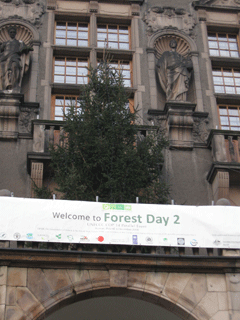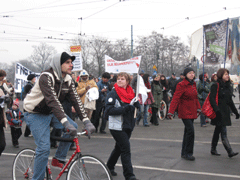A Treaty to Slow Deforestation
Air Date: Week of December 12, 2008

(Photo: Ingrid Lobet)
Cutting and burning trees releases more greenhouse gases than all the vehicles driving around the world, so protecting the world’s tropical forests was high on the agenda at the UN climate talks in Poland. As Living on Earth’s Ingrid Lobet reports, the indigenous groups most affected by deforestation haven’t yet had a place at the table when decisions are made about climate policy.
Transcript
CURWOOD: It's Living on Earth. I'm Steve Curwood at the United Nations Climate talks in Poznan, Poland.
[SOUNDS OF MARCHERS CHANTING AND DRUMMING]
CURWOOD: Young people have filled the streets of Poznan several times in recent days to urge governments to move forward, on all fronts on climate change.

(Photo: Ingrid Lobet)
LOBET: Hi, Steve.
CURWOOD: So Ingrid, the notion that protecting forests could help fight climate change goes back to the earliest climate negotiations, but it never made it into the original Kyoto accord of 1997. What are people saying now about forests getting back on the agenda?
LOBET: Well, as it becomes clear that climate change isn't just something in the future, but already in the present - there's the growing sense that slowing tropical forest losses is a must. Consider that chopping and burning of tropical forests releases more greenhouse gases than all the cars and trucks driving around the planet. And deforestation might be slowed down a lot quicker than changing the whole car industry.
CURWOOD: Now I understand there have been some big announcements from Brazil and Peru on this?
LOBET: Yeah, just a few days ago, Brazil became the first major-emitter, developing country to take on targets to reduce greenhouse gases - they said they'd dramatically cut deforestation - and considering that Brazil and Indonesia together are responsible for about half of those forest emissions, that is a big deal.
Peru has also followed with a goal to get to zero deforestation.
[POLISH YOUTH ORCHESTRA: “OYE COMO VA”]
CURWOOD: Wait a second, Ingrid - are we in Peru?
LOBET: No we're in Poland. That's a youth orchestra playing Tito Puente to a large group of people gathered for a full day focused on forests.
LOBET: This was only the second time there's been a day devoted to forests and it drew nearly a thousand people. A lot of scientists and reforestation and agriculture experts. Not so many people who actually live in the Amazon and Indonesian forests. That's been a tension throughout this year's talks. But there are also increasing points of agreement in this crowd about how to address deforestation.
NILES: It is clearly one of the most devastating land use phenomenons on the planet.
LOBET: John-O Niles, director of the nonprofit Tropical Forest Group, points out deforestation isn't just the world's second largest source of greenhouse gases.
NILES: It is the largest source of species extinctions, it can have massive health and human impacts, it destroys biodiversity, biochemical diversity in species that we've yet to even discover.
LOBET: So as scientists find there's less time than we thought to avoid real climate disruption, people have gotten really interested in actions you can take that have a more immediate effect. Martin Parry is a research scientist and co-chair of last year's climate assessment.
PARRY: We've left ourselves a lot to do in a short time. To cut 1990 level emissions by 80 percent by 2050, starting now. We cannot possibly achieve this mitigation target without transforming global forest trends.
LOBET: Climate experts have long understood that forest emissions are a major part of global warming. But the whole question of land use, tropical and temperate forests became too complex to get consensus in earlier climate change talks. Since then, the desire and willingness of many tropical countries to address forest emissions has been growing.
Many take heart that if you can pay people who live in or near the forest to protect the trees, it holds the promise for addressing global warming, deforestation and rural poverty - all at the same time.
[SOUNDS OF PROTEST: “NO RIGHTS, NO REDD!”]
LOBET: But as interest in reducing emissions from deforestation grows, so have concerns about it. Here in Poznan, several indigenous groups protested when language explicitly recognizing indigenous rights didn't make it into official proposals. Instead, indigenous groups were invited to give input to the next stage of the talks. Jorge Furagaro, an Amazon leader from Colombia, said what's essential is that indigenous nations aren't just consulted about carbon-storing projects, but that they can veto them.
FURAGARO: [Speaking in Spanish] Through interpreter: What we don't want to see is negotiators coming down here, going around our leaders, to community members who don't read or write and then saying, "Look I've got their signatures."
LOBET: Many of the forest experts here say projects to store carbon in trees must not restrict poor people's access to the medicine, food, and fuel that they get in forests. They also shouldn't create incentives for governments to take control of native land.
EHRHART: This man is being arrested for going into a forest reserve.
LOBET: Charles Ehrhart is with Care International.
EHRHART: This is exactly what concerns many indigenous peoples and local communities. They're worried that what REDD carbon finance is going to do is provide the state with resources they have been previously lacking to enforce their claim: what you're going to see is carbon conservation enabling a fortress forest approach.

(Photo: Ingrid Lobet)
NURAIN: Let us be very clear: We should not let the self interest of countries who could not reduce emissions at home, and wanted a cheap deal, consulting companies, banks, to do creative carbon accounting, to do what is today being called counterfeit carbon currency creations. Forests are about survival of large numbers of poor people. This is not a resource that we can allow the world to play around with.
LOBET: Even if wealthier countries do pay a lot to tropical forest nations, more than they first imagined, avoiding deforestation and degradation may still be both cheaper and quicker than changing industrial systems. And that's why many people, including Lars Lovold of Rainforest Foundation Norway, are hopeful. He's been working with indigenous people on rainforest protection for 30 years.
LOVOLD: Suddenly we are willing to put money behind this on a totally different scale than before. We are now talking billions of dollars. This is a totally new situation, which actually makes it possible to protect forests.
LOBET: And Steve it's that possibility, of more attention and more money, that makes this issue hopeful despite the controversy.
CURWOOD: So Ingrid, how far does that hope carry us toward a real agreement? We're in Poznan right now. In just a year, in Copenhagen, they're supposed to come up with a full treaty.
LOBET: Well there’s a large and growing number of people who want forestry issues to be part of the world's united climate effort. So it's looking a lot more likely they're going to find a way to make this work.
CURWOOD: Thanks, Ingrid. We'll be checking in with you on these forestry issues again come January. In the meantime, thanks for coming to Poland.
LOBET: My pleasure.
Living on Earth wants to hear from you!
Living on Earth
62 Calef Highway, Suite 212
Lee, NH 03861
Telephone: 617-287-4121
E-mail: comments@loe.org
Newsletter [Click here]
Donate to Living on Earth!
Living on Earth is an independent media program and relies entirely on contributions from listeners and institutions supporting public service. Please donate now to preserve an independent environmental voice.
NewsletterLiving on Earth offers a weekly delivery of the show's rundown to your mailbox. Sign up for our newsletter today!
 Sailors For The Sea: Be the change you want to sea.
Sailors For The Sea: Be the change you want to sea.
 The Grantham Foundation for the Protection of the Environment: Committed to protecting and improving the health of the global environment.
The Grantham Foundation for the Protection of the Environment: Committed to protecting and improving the health of the global environment.
 Contribute to Living on Earth and receive, as our gift to you, an archival print of one of Mark Seth Lender's extraordinary wildlife photographs. Follow the link to see Mark's current collection of photographs.
Contribute to Living on Earth and receive, as our gift to you, an archival print of one of Mark Seth Lender's extraordinary wildlife photographs. Follow the link to see Mark's current collection of photographs.
 Buy a signed copy of Mark Seth Lender's book Smeagull the Seagull & support Living on Earth
Buy a signed copy of Mark Seth Lender's book Smeagull the Seagull & support Living on Earth

